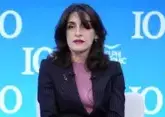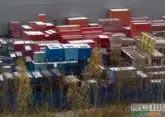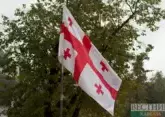The two-day official visit of the Armenian President to Georgia has been completed. Serzh Sargsyan arrived in Tbilisi together with his wife. But the composition of the official delegation, which, in addition to the Minister of Foreign Affairs, included the Minister of Defense and the Minister of Transport, was more illustrative. According to Vestnik Kavkaza, a significant difference in the ceremonial and real powers of certain figures remains one of traditional difficulties in preparing the Armenian President's visit to Georgia (as well as visits of other post-Soviet leaders).
In the 1990s, when Georgia's president was heading the Government within the framework of the "US model" of the separation of powers, the then prime minister of Armenia complained that he "does not even know who to call", because Georgia's president was a too high rank to solve current issues with them, and the first vice-premier is lower in rank than the head of Armenia's Cabinet. The situation is essentially the same now: President Giorgi Margvelashvili, being the head of state, does not have the power of authority under the Constitution, that is, he decide nothing. The real power in the country lays with Prime Minister Giorgy Kvirikashvili.

In this situation, protocol nuances are easier to handle than diplomatic ones, because sometimes not only statements made during the visit are crucial in diplomacy, but where they were made, when and during the meeting with whom. President Sargsyan's two-day and very eventful visit became an instructive example of solving little dilemmas that arise in such cases. The Armenian leader met both with the president and the prime minister, as well as with the chairman of the parliament and the country's spiritual leader, Catholicos-Patriarch of All Georgia Ilia II. During the meeting with President Margvelashvili, Sargsyan voiced the proposal about Georgia's "chances" to learn the art of complimentation from the neighboring country: "Georgia can take advantage of Armenia's opportunities to export its products to the Eurasian Economic Union's market," the Armenian President said, adding that the Georgia side should use Armenia's participation in free trade zones. "Any Georgian organization registered in our country can benefit greatly. For example, from trade with Iran." So Sargsyan hinted that the export of Georgian products to Russia by the same scheme - through legal entities registered in Armenia - could be just as beneficial.
Margvelashvili said that Tbilisi "welcomes Yerevan's signing of the Agreement on a Comprehensive and Enhanced Partnership with the EU." "This is an important message from the EU and a new opportunity for mutual cooperation in the future," the Georgian leader said, without specifying that the Armenian "legal entities" registered in Georgia can take advantage of Georgia's membership in the "free trade zone with the EU" for exporting products to the European market.
Indications were also The statements made on the subject of conflicts were also illustrative. "We discussed the issues of security and stability in the South Caucasus," Sargsyan said, arguing for the need to "maintain a balanced approach to sensitive for us issues." Translated from the diplomatic language, the phrase means that Tbilisi's position is not always "balanced" in the course of voting in international organizations on resolutions proposed by Azerbaijan. Including, for example, those in the UN on refugees and the principle of territorial integrity of states. "We strive to get such documents, statements, which would not contradict Georgia's interests at all our negotiations," the Armenian President assured, hinting that Tbilisi does not always strive to reciprocate.
Giorgi Margvelashvili, who is not proficient in lingua diplomatica, did not recall that when voting at the UN on the issue of refugees, the two countries always occupy diametrically opposite positions.

The issues of transport and communications were the most frequently mentioned during the Tbilisi meetings. "Transit" was the least frequently mentioned in the course of public speeches word, although the problem of stable and uninterrupted transit of goods from Armenia to Russia was the main one during Sargsyan's meetings with Kvirikashvili.
It's no accident that the timing of this visit coincide with the completion of many years of negotiations between Russia and Georgia on trade corridors through the territories of Abkhazia and South Ossetia. Tbilisi has already signed a contract with the Swiss company SGS regarding the monitoring of cargo traffic. First of all, this is about the automobile traffic through South Ossetia and the railway traffic through Abkhazia in the long term.

"The problem was illustrated" by a heavy snowfall during President Sargsyan's visit to Georgia, which blocked all mountain passes, including the Georgian Military road, the only land road through which Armenian cargo can enter the Russian Federation. The road from South to North Ossetia is also covered with snow, however, the Tskhinvali-Vladikavkaz road is cleaned traditionally faster than the Tbilisi-Kazbegi-Vladikavkaz highway.
Apparently, Armenia expects to redirect a significant part of its cargo via an alternative road through South Ossetia already in the spring. In 2018, talks may start on the restoration of railway traffic on the Yerevan-Tbilisi-Sukhumi-Sochi route as well. But it requires all the parties to overcome the inevitable difficulties of both economic, financial and political nature.
The main message of the Armenian president was that Yerevan is ready to help Georgia in this process with the use of its foreign policy resources.











